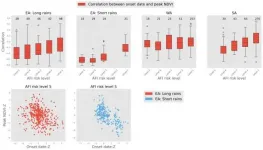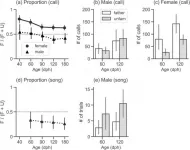(Press-News.org) Antidepressants are commonly used worldwide to treat pain, however new research from the University of Sydney shows they offer little to no help for people suffering chronic back pain and osteoarthritis and may even cause harm.
Back pain and knee osteoarthritis affect millions of people globally and are leading causes of disability. When first-line pain medications such as paracetamol and ibuprofen fail to improve symptoms, many people are prescribed antidepressants for their pain. Most clinical practice guidelines recommend antidepressants for long term (chronic) back pain and hip and knee osteoarthritis, yet evidence supporting their use is uncertain.
Published today in the BMJ the study investigated the efficacy and safety of antidepressants for the treatment of back pain and osteoarthritis compared with placebo.
The authors hope this study could help clinicians and patients make more informed decisions about whether to treat chronic back pain and osteoarthritis pain with antidepressants.
"The use of antidepressants to treat people with chronic back pain and osteoarthritis is increasing worldwide, but prior to our work, it was not clear whether antidepressants relieved pain or were safe," said lead author Dr Giovanni Ferreira, postdoctoral research fellow at the Institute for Musculoskeletal Health at the University of Sydney and Sydney Local Health District and the University's Faculty of Medicine and Health.
"We conducted a review of all randomised clinical trials evaluating the efficacy of antidepressants for people with back pain or knee osteoarthritis and found that for back pain the antidepressants were either ineffective or provided a very small effect, which was unlikely to be perceived as worthwhile by most patients. For people with osteoarthritis, effects were still small, but could be potentially perceived as worthwhile by some patients," he said.
"It is concerning as some antidepressants significantly increase the risk of a person to experience adverse events. Many people are being treated with these medications that may not be helping their pain and may be doing them harm."
About the study:
The study was a systematic review and meta-analysis that included 33 randomised controlled trials with more than 5,000 participants with low back or neck pain, sciatica, or hip or knee osteoarthritis.
The trials tested six classes of antidepressants including serotonin-noradrenaline reuptake inhibitors (SNRIs) and tricyclic antidepressants.
The study set a difference of 10 points on a 0-100 scale for pain as the smallest worthwhile difference between groups, which is a common threshold in studies of chronic pain.
Most clinical trials included in the review did not include patients with pain and depression. The results apply to patients treated with these drugs for their pain condition, not depression in people living with pain.
Key findings:
- SNRIs had a trivially small effect on back pain, reducing pain by just 5.3 points out of 100 on the pain scale compared with placebo after three months. This amount is unlikely to be considered clinically important by most patients.
- SNRIs had a slighter stronger effect on osteoarthritis pain after three months, with an average difference of 9.7 points on the pain scale compared with placebo. This amount is still small, but close to the 10 point difference needed for antidepressants to be considered worthwhile by some patients.
- Tricyclic antidepressants were ineffective for back pain and related disability
- Tricyclic antidepressants and SNRIs might reduce pain in people with sciatica (pain down the leg associated with back pain), but the evidence was not certain enough to draw any firm conclusions.
- SNRI antidepressants significantly increased the risk of patients experiencing an adverse event; about two-thirds of patients taking this class of antidepressant had at least one adverse event such as nausea.
Professor Andrew McLachlan, Head of School and Dean of Pharmacy at the University of Sydney and co-author on the study, strongly advises those currently taking antidepressants for treating back pain and osteoarthritis not to abruptly cease treatment with antidepressant medicines but to consult with their doctor.
"This can lead to withdrawal effects which can be distressing and sometimes present as serious health issues. These withdrawal effects include dizziness, nausea, anxiety, agitation, tremor, sweating, confusion and sleep disturbance."
Dr Ferreira added: "More research is needed to resolve uncertainties about the efficacy of antidepressants for sciatica and osteoarthritis highlighted by this review."
INFORMATION:
Antidepressant drugs are largely ineffective for back and osteoarthritis pain, despite being widely used for these conditions, suggests a review of the evidence published by The BMJ today.
The findings, based on moderate certainty evidence, show that for people with back pain the effects were too small to be worthwhile, but for osteoarthritis a small beneficial effect cannot be ruled out.
Most clinical practice guidelines recommend antidepressants for long term (chronic) back pain and hip and knee osteoarthritis, yet evidence supporting their use is uncertain.
To address this knowledge gap, researchers led by Giovanni Ferreira at the ...
Adding the arthritis drug tocilizumab to standard care for patients in hospital with severe or critical covid-19 is no better than standard care alone in improving clinical outcomes at 15 days, finds a new trial published by The BMJ today.
There was an increased number of deaths at 15 days in patients receiving tocilizumab, resulting in the trial being stopped early.
Today's results contradict earlier observational studies suggesting a benefit of tocilizumab. However, observational effects are limited by a high risk that they may be due to other unknown (confounding) factors - and some studies have not yet been peer ...
MINNEAPOLIS - A new study has found a brain pressure disorder called idiopathic intracranial hypertension is on the rise, and the increase corresponds with rising obesity rates. The study is published in the January 20, 2021, online issue of Neurology®, the medical journal of the American Academy of Neurology. The study also found that for women, socioeconomic factors like income, education and housing may play a role in their risk.
Idiopathic intracranial hypertension is when the pressure in the fluid surrounding the brain rises. It can mimic the symptoms of a ...
MINNEAPOLIS - A new study shows that intense immunosuppression followed by a hematopoietic stem cell transplant may prevent disability associated with multiple sclerosis (MS) from getting worse in 71% of people with relapsing-remitting MS for up to 10 years after the treatment. The research is published in the January 20, 2021, online issue of Neurology®, the medical journal of the American Academy of Neurology. The study also found that in some people their disability improved over 10 years after treatment. Additionally, more than half of the people with the secondary progressive form of MS experienced no worsening of their symptoms 10 years after a transplant.
While most people with MS are first diagnosed with relapsing-remitting MS, marked by symptom ...
The new tech elite share distinct views setting them apart from other segments of the world's elite more generally, according to a study published January 20, 2020 in the open-access journal PLOS ONE by Hilke Brockmann from Jacobs University Bremen, Germany, and colleagues.
The global economic landscape over the last half-century is marked by a shift to a high-tech economy, dominated by the "Big Nine" (Amazon, Apple, Facebook, Google, IBM, Microsoft, Alibaba, Baidu, Huawei, and Tencent), computer hardware and software manufacturers, and most recently, app companies. In this study, Brockmann and colleagues investigate the worldviews of the 100 richest people in the tech world (as defined by Forbes).
Though the authors initially approached all 100 of their subjects for a face-to-face ...
In the Early Bronze Age of Europe, ancient people used bronze objects as an early form of money, even going so far as to standardize the shape and weight of their currency, according to a study published January 20, 2020 in the open-access journal PLOS ONE by Maikel H. G. Kuijpers and C?t?lin N. Popa of Leiden University, Netherlands.
Money is an important feature of modern human society. One key feature of money is standardization, but this can be difficult to identify in the archaeological record since ancient people had inexact forms of measurement compared with today. In this study, the authors assessed possible money from the Early Bronze Age of Central Europe, comparing the objects based on their perceived - if not ...
The onset date of the yearly rainy season reliably predicts if seasonal drought will occur in parts of Sub-Saharan Africa that are particularly vulnerable to food insecurity, and could help to mitigate its effects. Shraddhanand Shukla and colleagues at the University of California, Santa Barbara's Climate Hazards Center, present these findings in the open-access journal PLOS ONE on January 20, 2021.
Climate-driven seasonal drought can impact crop yields and is among major contributors to food insecurity, which can threaten people's lives and livelihoods. In the last ...
There may be over 34,000 street cattle in the Indian city of Raipur (one for every 54 human residents), with implications for road accidents and human-cattle conflict.
INFORMATION:
Article Title: A population estimation study reveals a staggeringly high number of cattle on the streets of urban Raipur in India
Funding: The author(s) did not receive any specific funding for this work. However, this work is a part of the Doctor of Philosophy thesis of one of the authors, BKS, who is getting a Junior Research Fellowship under the scheme CSIR-UGC NET for JRF [Sr. No. 2121530765. ...
Fixed dose combinations of antibiotics are consumed in huge quantities globally, but 80 percent of combinations are not on the WHO Essential Medicines List, and 92 percent are not FDA-approved, - with inappropriate combinations risking inefficacy, toxicity, and selection for antimicrobial resistance
INFORMATION:
Article Title: High global consumption of potentially inappropriate fixed dose combination antibiotics: Analysis of data from 75 countries
Funding: We received no specific funding for this work.
Competing Interests: The authors have declared that no competing interests exist.
Article URL: https://journals.plos.org/plosone/article?id=10.1371/journal.pone.0241899
...
Daddies' girls? Female Bengalese finches prefer their father's song to that of other birds throughout their lives - while sons lose this preference as they grow up.
INFORMATION:
Article Title: Sex differences in the development and expression of a preference for familiar vocal signals in songbirds
Funding: This work was supported by MEXT/JSPS KAKENHI Grant, Numbers 17H06380 to KO & 17J07023 to TGF. The funders had no role in study design, data collection and analysis, decision to publish, or preparation of the manuscript. (https://www.jsps.go.jp/index.html)
Competing Interests: The authors have declared ...



